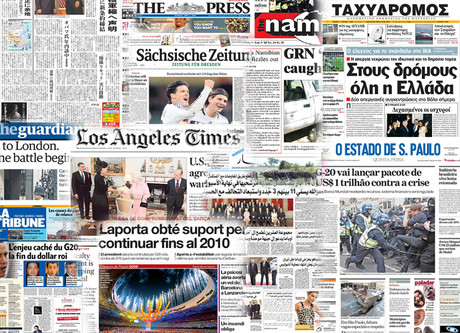Lack of Affordable Investment in the Newspaper Industry
Over 60% of newspapers worldwide are locally privately owned entities and the majority operate in emerging and developing markets. These all have characteristics of early-stage capital markets. When private newspaper companies that have tested and successfully confirmed their core business model start looking for investment to expand, they will likely fail to find the required capital after the first round of "founders, friends and family" support is exhausted.
Lack of investment in the core business is considered one of the major problems facing newspapers in developing markets. Expanding operations, developing new products, and investing in new staff or printing facilities are areas where capital is most needed. There is a capitalisation gap in the media market that mirrors that of the general early-stage capital markets; developing media companies find a particular need for between $100,000 to $2 million from outside sources. Local commercial banks that are often the only available sources of investment provide very expensive, short-term debt financing. An alternative option for media is to secure affordable loans and equity financing from powerful financial elites. In fragile democracies and developing markets, owners and editors of private media enterprises know that this usually means doing business with strings attached.
Private Newspapers Exposed to Economic Pressures
It is therefore unsurprising to find that over 40% of newspaper executives surveyed for the latest WAN-IFRA Emerging Markets research study say that economic pressures and conditions in the market are the main threat to their editorial independence. Poorly developed market mechanisms and structures are not a fertile ground for growing financially viable, professional and independent media companies.
To address the obstacles facing media in need of economic support and investment, WAN-IFRA, in partnership with the Swedish International Development Cooperation Agency (Sida) and the Media Development Loan Fund (MDLF), has launched the Social Investment in Media Initiative promoting innovative investing mechanisms in media in developing countries and emerging markets. The three organisations share the conviction that financially healthy media outlets are one of the key conditions for the existence of a free press.
"Media development funders are becoming increasingly aware that capital in the form of a formal investment - affordable loan or guarantee - can be catalytic and valuable for many media organisations in the developing world, particularly if matched with technical assistance grants," said Pia Hallonsten, Senior Policy Specialist at the Swedish International Development Cooperation Agency (Sida).
Double Bottom Line Media Finance
Capital in the form of a formal investment can be catalytic and valuable for many media organisations in the developing world. One path to "affordable capital" is through Programme Related Investments (PRIs) that enable charitable foundations and donors to invest on a for-profit basis in programme areas of their interest.
The goal of social investment is to maintain healthy financial structures while protecting the social value of media firms as democratic institutions. The Media Development Loan Fund is a mission-driven investment fund that provides low-cost capital and technical know-how to help journalists in challenging environments build sustainable businesses around professional, responsible, and quality journalism. The Media Development Loan Fund has a unique track record in creating investment products in independent media that provide both financial and social returns for investors, including listing the Voncert investment product on the Zurich Stock Exchange.
"Impact investments in independent media provide an opportunity to invest in a sector - a free press - that underpins all other areas of development," said Sasa Vucinic, Managing Director of MDLF. "The Social Investment in Media Initiative will provide investors with practical ways of combining high social returns with competitive financial returns."
From 1996 to 30 September 2010, MDLF provided $99.8 million in affordable financing, including $86.6 million in loans and equity investments. It has financed 221 projects for 74 independent media companies in 24 countries and has written off only 1.88% of the total loaned and invested. While in the last two years the biggest media outlets worldwide were struggling with outstanding debts and faced difficulties with servicing banks and stakeholders, all MDLF clients have retained stable business operations, have paid their dues on time, and continue to produce professional and independent content.
Unlike most media investors in the US and the UK that have burdened their media enterprises with excessive debt combined with short-term profit maximisation strategies, MDLF nurtures double bottom line media financing that maintains healthy financial structures and strengthens the social value of media outlets as democratic institutions.
Social Investment in Media part of WAN-IFRA's Strategic Approach
The Social Investment in Media Initiative works in conjunction with newspapers, investors, the international development community and all interested stakeholders to exchange experiences, promote innovative investment mechanisms and increase social investment in sustainable media development. The Social Investment in Media Initiative also includes regular expert meetings and briefings that bring media together with investors, donors and development organisations to improve collaboration in media development financing and investment.
The first meeting, held in Stockholm in May this year, under the heading Investing in Media - Strategies for Sustainable Media Development , brought together 31 organisations including donors, publishers, media support organisations, non-governmental organisations and loan funds to discuss strategies for investing in sustainable media development initiatives.
One of the conclusions from the meeting was that socially conscious investment was a necessary element in emerging markets to nurture high-impact social businesses.
The Swedish International Development Cooperation Agency (Sida) and WAN-IFRA are conducting an ambitious strategic partnership to advance media development and press freedom worldwide. The partnership allows WAN-IFRA to broaden and develop its press freedom and media development activities to support free and financially sustainable media worldwide. A series of pilot projects to test new methods and approaches in strengthening media in emerging markets was launched at the beginning of this year.
Download the Investing in Media - Strategies for Sustainable Media Development report in .pdf format.



